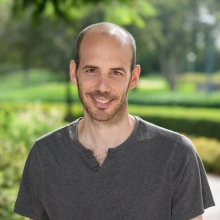Israel Prize to Prof. Adi Kimchi
Honor highlights her insights on a cell’s life-and-death decisions
Features

Prof. Adi Kimchi, a member of the Weizmann Institute’s Department of Molecular Genetics, has won this year’s Israel Prize for Life Sciences—recognizing her trailblazing work in the field of programmed cell death.
She will receive the prestigious award, the country’s highest honor, at an annual state ceremony in Jerusalem on Independence Day.
“Kimchi is one of the pioneers in deciphering the mechanism of programmed cell death in mammals,” a statement from the prize committee said.
Prof. Kimchi has made groundbreaking discoveries regarding a cell’s choice to live or die—identifying key factors called DAP genes that are responsible for this decision as well as the signaling pathways that drive different forms of death. In the 1990s, her lab developed RNA screening methods for identifying novel regulators and agents of cell death. Notably, her pioneering genetic screen was performed a decade before the discovery of the RNA interference system; indeed, it represents the first successful use of RNA-targeted functional screens for gene discovery.
She identified the most well-known DAP gene, DAP-kinase, as a tumor suppressor which led to her discovery of a new family of protein kinases She also developed systems-level platforms that integrate the various forms of cell death—apoptosis, autophagy, and programmed necrosis—into a common protein interaction map. This led to the discovery of new principles underlying the functional organization of this complex protein network, including molecular switches and back-up mechanisms that maintain the robustness of cell death responses. These discoveries opened up an exciting future opportunity in precision cancer therapy of the ability to identify points of vulnerability in patients’ tumors by a protein-based pre-screening platform.
“Prof. Kimchi has developed pioneering approaches in deciphering the complex pathways in human cells that control life—and-death decisions of cells and cancer development,” the prize committee statement added. “Her work has revealed innovative systemic molecular mechanisms for understanding the process of cell death at the level of protein production and decomposition.
As the committee noted, Prof. Kimchi’s achievements at the Weizmann Institute extend far beyond the lab. She is particularly active in supporting the progress of female scientists on campus and formerly served as the President’s Advisor for Advancing Women in Science at the Institute, which runs the highly successful Israel National Postdoctoral Program for Advancing Women in Science.
“Prof. Kimchi is everything that an Israel Prize laureate should be—innovative, brilliant, groundbreaking, and breaking conventions,” Education Minister Naftali Bennett tweeted. “For years, she has worked to advance women in science and to strengthen the status of Israeli academia around the world. What pride.”
Prof. Kimchi is supported by the Helen and Martin Kimmel Institute for Stem Cell Research. She is the incumbent of the Helena Rubinstein Professorial Chair in Cancer Research.








